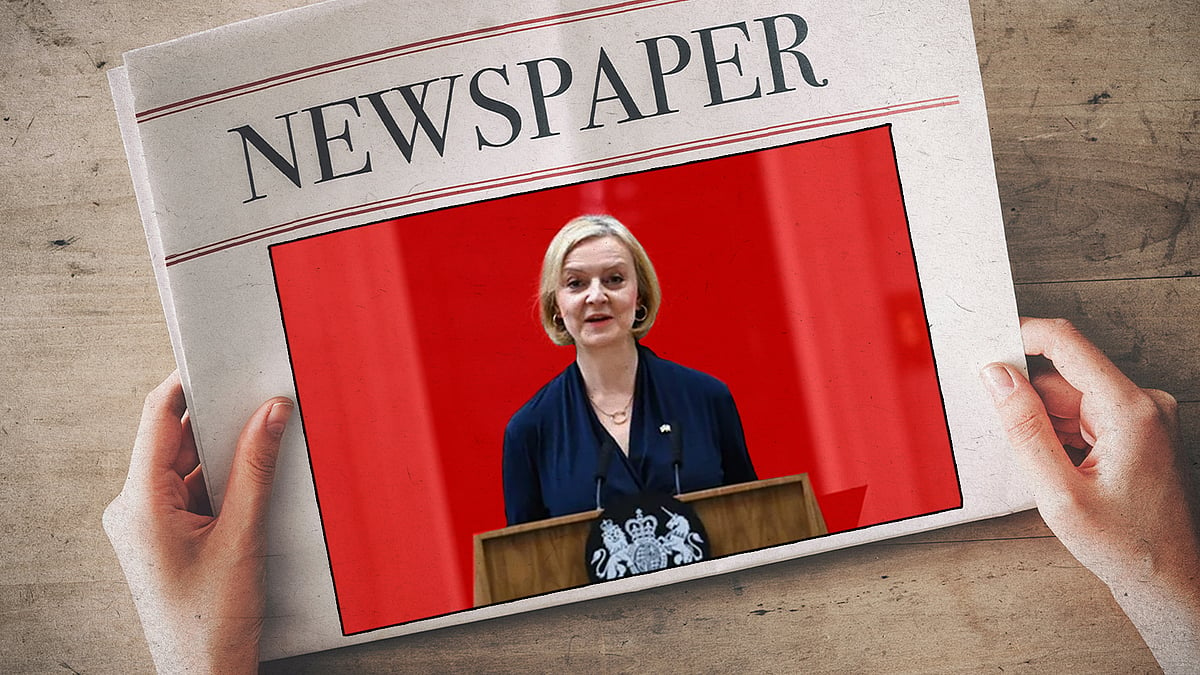‘From Age of Empire to Rishi Raj’: Rishi Sunak is front-page news across India’s English papers
Except for the Telegraph, which devoted itself to other matters.
Rishi Sunak is the UK’s new prime minister, and Indians across the world are tripping over themselves to claim him as one of their own. The Conservative leader, whose parents migrated to the UK from East Africa, met King Charles last evening and was officially invited to form a new government.
So, was Sunak front-page news across leading English newspapers in India? Yes – with one exception.
“History turns full circle,” the Times of India proclaimed in its Delhi edition, “as 1980-born Rishi Sunak becomes the first person of Indian origin…to be prime minister of the once colonial power from which India wrested independence 75 years ago.”

Detailing Sunak’s marriage to the daughter of Infosys founder NR Narayana Murthy and their positions as “multimillionaires”, TOI noted that Sunak took oath on the Bhagavad Gita and that he is a “Star Wars fan who wanted to grow up to become a Jedi knight”. Its editorial – which described Johnson and Truss as “stars of this shabby soap opera” – also pointed out that India and Britain “are not each other’s most important partners” despite “much being made of the India-UK FTA”.
The New Indian Express headline started off with a bang but fizzled out before its punchline – “Balle! Balle! Rishi Sunak UK PM”. Sunak “plunged the knife into his predecessor Liz Truss”, the front-page report said, “saying he intends to fix her mistakes”.

A smaller story detailed Sunak’s family’s roots in Gujranwala, now Pakistan, where “locals have no knowledge as to which particular place or house his grandparents lived in”. An editorial said Sunak faces a “bevy of challenges” and that he “hardly represents, in an active political sense, Britain’s immigrants”.
The Indian Express and the Hindu both had Sunak leading their front pages, albeit with more staid headlines.
“Rishi Sunak takes charge: ‘I am not daunted, difficult decisions to come’” was the main headline on Express’s page 1. The Hindu chose “Rishi Sunak becomes Britain’s first non-white Prime Minister”, its report also quoting the Labour Party’s deputy leader as saying Sunak “has no mandate and the British people have had no say”.


Indian Express had an editorial on Sunak’s prime ministership, pointing out his “rise to power is not an underdog tale”. “Rishi Sunak is a politician in the Boris Johnson mould,” it said, but “as divorced as Sunak may be from the experiences of the middle class struggling with price rise, his background and his journey bear testament to the possibilities contained in the movement of people and capital across borders”.
Hindustan Times’s lead story on page 1 announced that history “gets an Indian twist as Britain is ready for Rishi” – “the latest turn in a series of political twists in the country that ended with an Indian touch”. A smaller story quoted Sunak’s father-in-law Narayana Murthy as saying he was “proud” and “confident he will do his best”.

The newspaper also had an editorial striking a note of caution: “But celebrations…will have to wait. That’s because Mr Sunak, the UK’s third PM in a month-and-a-half, faces tough economic and political challenges.”
Finally, there was the Telegraph. Never one to disappoint, Telegraph didn’t have Sunak on its front page at all, apart from a very brief snippet headlined “Rishi pledge”. Otherwise, page 1 was devoted to how the outgoing Chinese ambassador “cautioned New Delhi against the West”, and the central government’s delay in clearing the elevations/transfer of two judges.

Telegraph didn’t have an editorial on Sunak too.
Of course, it’s worth reiterating that Sunak’s faith and ethnic origin, which are a big deal in India, are irrelevant in Britain. Why? Read this report in Newslaundry to find out.
 ‘Dizzy Lizzy falls from grace’: Liz Truss is front-page news across English papers in India
‘Dizzy Lizzy falls from grace’: Liz Truss is front-page news across English papers in India India’s media is taking the wrong lessons from Rishi Sunak’s rise
India’s media is taking the wrong lessons from Rishi Sunak’s riseNL Digest
A weekly guide to the best of our stories from our editors and reporters. Note: Skip if you're a subscriber. All subscribers get a weekly, subscriber-only newsletter by default.
